Mindhunter: A gritty insight into criminal psychology
Joe Penhalls Mindhunter, is a Netflix original series set in the 1970s circulated around criminal psychology and the motives possessed by sociopathic murderers. FBI agents Holden Ford (Jonathan Groff) and Bill Tench (Holt McCallany) interview a plethora of serial killers who are serving life sentences in order to gain understanding of what causes them to commit such heinous crimes and apply this newfound knowledge to bring more killers to justice and better yet, stop them from being created in the first place. The series is based off the True crime book of the same name and features real life serial killers such as Edmund Kemper’ and Richard Speck among others.
What makes Mindhunter so special?
Mindhunter has carved somewhat of a niche within a niche for itself akin to many other gritty Netflix originals i.e. Daredevil. It’s not your run of the mill cop drama by any stretch of the imagination. The series-though brooding, twisted and dark- much like many other detective drama, is unique in the sense that it offers a chilling realism which amplifies its impact. As Holden and Tench continue to interview these maniacal fiends, they begin to truly get into their heads and as they do, the audience does as well: perhaps more-so because each and every one of these killers once walked among society in the real world. It is this aspect of realism which is both thought provoking and tormenting which seperates Mindhunter from other shows of the same likeness.
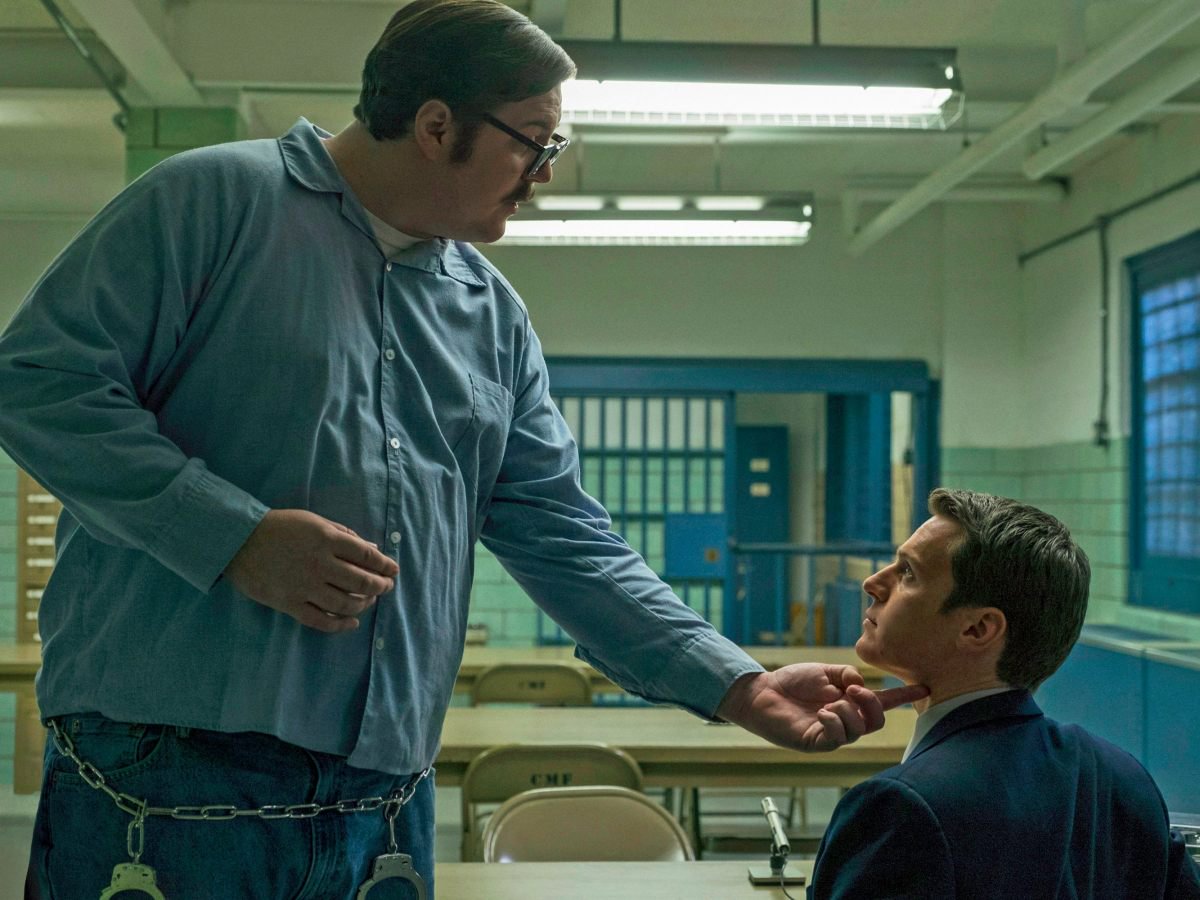
Perhaps more compelling than watching some of the most notorious psychopathic murderers of all time brought to the small screen, would be the enthralling dialogue which their twisted minds manufacture. One of the series biggest strengths was its ability to show less and say more. Instead of having overly gratuitous violence, the show offered something more chilling and that was hearing the people behind these murders speak on their actions with remorselessness. Among such interviews was the ongoing dialogue with Edmund Kemper: a serial killer who was responsible for the abduction and massacre of several women, among them, his own mother. When Ford initially begins interviewing Kemper he is taken aback by his physical and mental superiority. Standing nearly 7 ft tall, its no surprise that he was adorned with the nickname ‘Big Ed’.
“Would you like an egg-salad sandwich?”
Despite what his size and criminal record would suggest, Kemper is somewhat placid to a disturbingly high degree given his mental corruption. His initial dialogue with Ford had him exchanging in human pleasantries such as offering Ford an egg-salad sandwich and speaking with him as if he were a friend and not a federal agent looking to pick his brain. Kemper, though lacking empathy, was extremely articulate demonstrating incredibly high intellect. It is this very composure which separates Kemper from just another mass murderer. He is entirely self-aware of his actions and this is evident with the chillingly monotonous way he describes his crimes. An example of this would be him describing to Ford, just exactly what it takes to kill someone by slitting their throat ‘ear to ear’. Even more disturbing is the way in which Kemper describes his ‘humiliation’ of his mother following her murder. Kemper seems truly void of human emotion in all of his encounters with Ford and Tench and agent Tench encapsulates his demeanour perfectly when he refers to Ed as ‘having nothing behind his eyes’. Despite his ability to conceal recognisable emotion however, Kemper is able to assimilate with neurotypical people and gain their sympathy- trait shared by many psychopaths which is as fascinating as it is terrifying.
What makes a killer tick? The science behind the psycho
Instead of telling one individual and linear narrative, Mindhunter chooses to tell fragmented anecdotes from each of the serial killers upbringing up until the time of their eventual incarceration. By doing so, they are given a background- a story which humanises them. By implementing this, audiences subconsciously find themselves empathising with them for the trauma they have endured, however much they condemn their actions. At times, it is difficult for both the audience and agent Ford to comprehend that Edmund Kemper has brutally murdered several women due to his aforementioned demeanour. This is amplified by the documentation of his rather isolated upbringing where he was neglected by his mother due to his innate psychopathic tendencies as a child. By gaining insight of this trauma, viewers begin to gain somewhat of an understanding of what drove Kemper to his ‘vocation’ (as he so nonchalantly describes it) as a serial killer. His mothers ‘matriarchal’ degradation of him began to manifest itself in his inability to form relationships with women- he’s describes himself has not being physically impotent but rather, emotionally impotent.
Mindhunter is largely an exploration of criminal psychology as oppose to the crimes themselves which is why such context is provided behind the grotesque murders. By providing such context, it becomes scientifically evident that psychopathic behaviour is one influenced by environmental factors as oppose to being innate. It is this very concept which allows the aforementioned empathetic reaction from both audiences and agent Ford whose psyche begins to grow more and more warped by his interactions with the criminally insane.
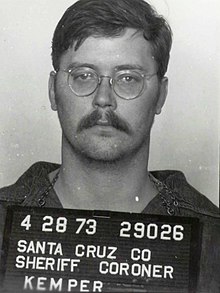
Criminal psychology: the method behind the madness
What allows Mindhunter to distinguish itself from essentially being a documentary would be how the personal lives of both agent Ford and Tench are afflicted by their rather disturbing line of work. At the beginning of the series, Ford seems to be innocently naive having a rather concrete view of criminals. Yes he is inquisitive of the enigmatic minds of those he brings to justice, but he has limited knowledge and actual interactions to base this conjecture from. It is not until he begins to actually interact with these killers that his own mind begins to get altered through influence. Agent Ford touched darkness and evidently it returned the favour.
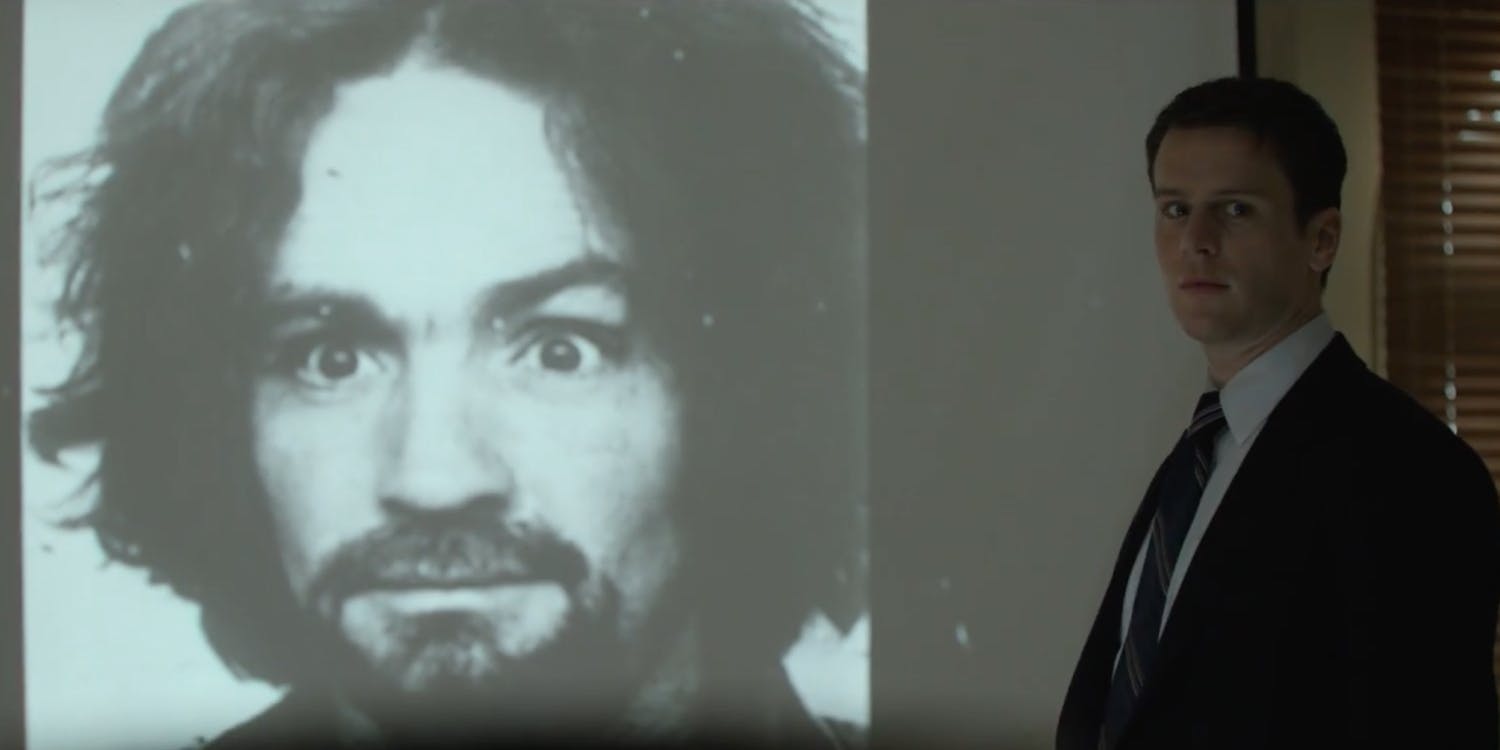
As Fords curiosity manifests itself within him, he begins to grow more and more ambitious in his career prospects. The 1970s was a time where criminal psychology was such a farfetched area of study which surface had barely been touched and Mindhunter exhibits this paradigm shift quite eloquently as Ford is deemed as heinous and sympathetic toward criminals when he approaches his FBI superiors with his proposition for a study into the motives of a killer.
The darkness within
Despite being clearly intimidated at first in his dialogue with Kemper, Ford submerges himself in the minds of other rapists and serial murderers alike and as a result of this, develops an insatiable lust for more insight. He is ultimately so adamant on making a breakthrough that it affects his relationship with his girlfriend Debbie. This degradation of empathy within him as well as the disturbing dialogues he has creates distance between the two- so much so that it affects their love life. This is evident when the mere sight of Debbie in high heels incites protruding thoughts within his head, reminding him of the fetishisation of the very same thing by serial killer ‘Jerry Brudos’.
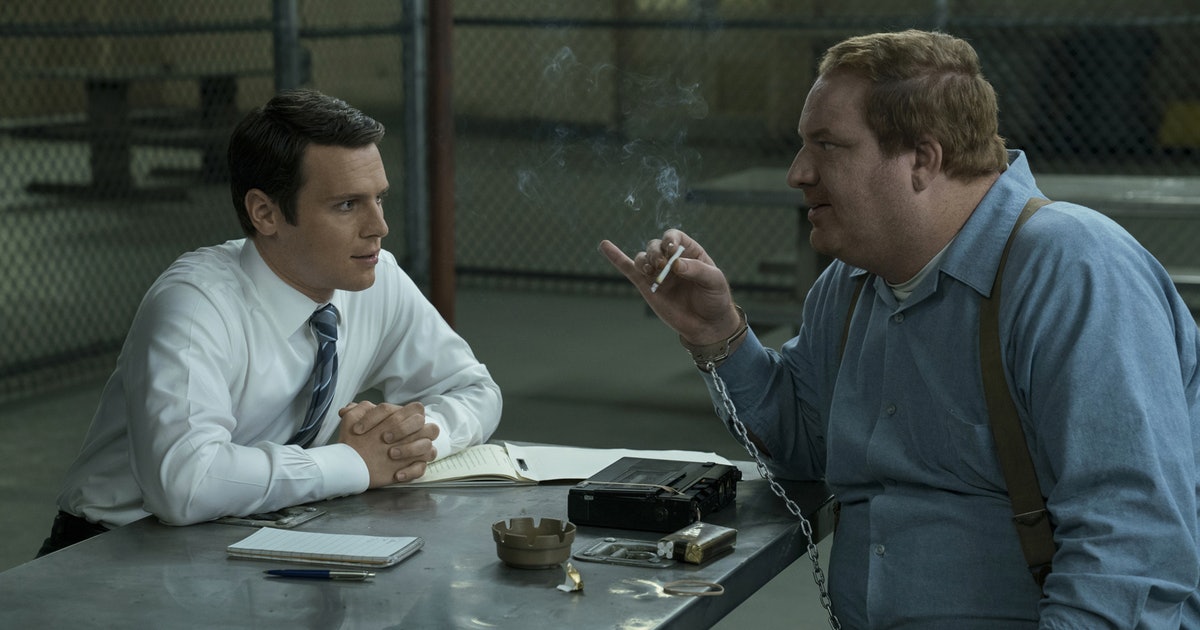
Towards the tail-end of the season, Fords idiosyncrasy completely alters him. His subjects grow less willing to partake in such dialogue so he himself has to emulate their behaviour in order to incite any form of response and he does so with unparalleled enthusiasm. Holden even begins to jokingly reference Ed Kemper’s perverted dialogue: “You gotta make it with that young p***y before it becomes Mom”, in an interrogation of a suspect in another case. Fords seemingly effortless ability to assume the perverted vernacular of a man who murdered his own mother shows extreme disparity to the character he was prior to undertaking his psychologically intense investigation. In perhaps the most memorably cold one-liner of the series, Holden provokes serial killer ‘Richard Speck’ who murdered 8 nurses by referring to his victims as ‘8 ripe c***ts’ in an effort to communicate with him. This kind of conduct would not be tolerated in 2017 let alone the more politically correct era of the 70s. Though he remains persistent, Holden eventually succumbs to the burden of rubbing shoulders with psychopaths as the season culminates with him having what appears to be a stress fuelled breakdown following yet another dialogue with Kemper. The two grew so close that it had Ford second guessing whether or not their conversations had transcended professional boundaries.
On the other end of the spectrum is Agent Tench who upon first glance, appears to be rather conventional in his approach to criminal psychology. Unlike Ford, he is less open to complex theories on how psychopaths are formed and the way they think and is more-so focused on apprehending them. This changes as the season progresses however as Tench begins to see things from Fords perspective as he gradually begins to understand criminal motive. This improved evaluative clarity doesn’t come without a cost however as his already neglected family life seems to get more and more compromised. This is evident upon initial introduction of his wife during a dinner with agent Ford and Debbie. In comparison to the younger couple, Tench and his wife seem rather despondent and this stems from Tench’s inability to interact with his son due to him being absorbed by his career responsibilities which intensify as the seriousness of him and Fords project becomes apparent. This is further evident in a powerfully dark scene where Tench’s son discovers his FBI evidence case files containing polaroids of mutilated corpses which causes extreme disturbance amongst his family. Though quite different individuals, agent Ford and Tench are personally afflicted by the darkness that has manifested within themselves as a result of their line of work.
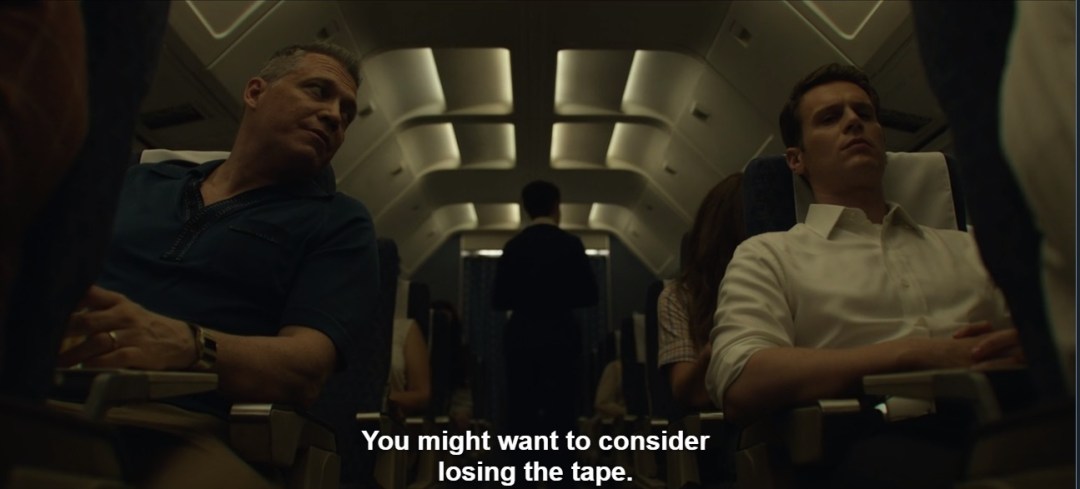
Retrospectively, the first season of Mindhunter was nothing short of excellent. It provided for an intriguing and informative exploration of the structural approach to crime taken by the FBI and explored the paradigm shift that was the introduction of criminal psychology. In addition to this it provided for enthralling personal subplots which explored the the psychological impact of interacting with evil and what it can awaken within. The show can be criticised for being reliant on tropes such as the alcohol dependant damaged and brooding cop persona, afflicted by his traumatic encounters which somewhat shines through in Agent Tench however these are mitigated by its excellent psychological storytelling and dedication to factual information. This series has more than enough potential to be even successful given the formula for success seen in both Netflix originals and gritty and dark criminal series.
What do you think? Leave a comment.











Two episodes in, I’m sold. Nice combo of the traditional crime story approach (naive young rookie teams up with cynical grizzled veteran), both roles well cast, but without the baggage of the crime-of-the-week structure to make this all too predictable. I remember the 70s and the light was not uniformly sepia (maybe we can cross this series with Ozark’s oppressive blues to get the full color spectrum) but I love the musical selections.
Watched all ten (40 min) episodes yesterday. Thoroughly enjoyed it, an almost prequel to Criminal Minds but much more gore. Look forward to rewatching it.
I’m on Episode 4 and really find that the 2 leads are miscast. Groff has such a placid look and soft voice all the time that I think he is the sociopath in the story. And his partner’s performance seems over the top…perhaps he is compensating for Groff’s inability to project real emotion. And I hate when movies set in earlier time periods use modern day language. When Groff says, “early days” for example…so much of the dialogue is too contemporary. I don’t think the writers did enough research.
Thanks for the info. I read some of the books on this but think that this series is one I would be interested in watching. As soon as I have some free time during this cold winter, I will definitely look up this series.
Quality production and acting script good but way too slow. Not enough drama excitement, it’s like their drawing out 2 seasons from one seasons worth of story. It was almost like The Office sometimes, only not as funny.
The girlfriend is the worst actor in the series. Uncharismatic and underwritten.
It’s Fincher at his best, reminds me a lot of the way Se7en was done. Opening episode is a mind blower.
Just watched the first 2 episodes, and I’m in for the long haul. Beautifully directed, and superbly deeply written. A slow burn indeed, with the genuinely scary and disturbing hulking presence of the serial killer Edmund Kemper. And none of the usual cop show clichés of fucked up but still quite sexy police married to the job. The cops here are mainly overweight, puffy and tired, middle aged combover types, struggling to do the right thing with limited insights. Lots of ‘70s details – cigarettes, sugar, browns and beiges. Good work, well done.
That’s what I thought, too. It isn’t glamorizing the ’70s or police work really.
I’ve only watched the first episode, but I can tell I will be a serial Flixer with this one. It is a bit too talky, but I suppose there will be enough graphic reconstructions in the course of the series to keep everyone happy. It is obviously going to concentrate on The Journey, of course, from law enforcement’s tough ‘n’ gnarly approach to Ford’s touchy-feely one. He’s a straight arrow trying to shoot through the counter culture of the Seventies and meeting resistance. Law enforcement is in a brave new crazy age of pissed-off people getting into random acts of motiveless violence. I think we’re still there.
The talkiness of it calls for good dialogue and I think it rises to the challenge. The real-life John Douglas was probably not such a naive, bland character as Holden Ford, but then it is the old innocence to experience thing being portrayed dramatically. Fincher is good at detailed storytelling and looks like the usual safe pair of hands. I thought it might be almost exclusively casefile-based but there is enough of the Douglas private life to make it all-too human.
All in all, a skilled adaptation of the book. It might go beyond the book and actually show the workings and lateral thinking that permits profilers to come up with such psychic-seeming detail: he is a white male aged between 25-45, who works in a blue-collar trade, still lives with at least one parent, is meticulous in his habits, will change his appearance after the murders, drives a well-maintained second-hand car…all that sort of thing. What are the actual mechanics of getting to that information? That might be asking too much from a drama but with that Seventies soundtrack the final twist of the knife, I still feel a bad case of bingewatch coming on…
So many shows about murdered and mutilated women. There’s something wrong.
I’ve watch anything directed by David Fincher several times – Seven, Social Network and Zodiac are modern classics. The only exception is Benjamin Button. Once was enough. Though there was a great shot of Brad Pitt riding a motor bike where for a few seconds he looked like the ultimate film star.
Alien 3?
Pretty much butchered by the studio edit, unless I’m mistaken. The script was written and re-written until it was a complete mess. The original ideas sound far better than the final version… https://en.wikipedia.org/wiki/Alien_3
Just bought the book – thought Fincher’s Zodiac was a fantastic movie, horrifying but a great portrayal of the work, dedication and obsession of catching a serial killer
With you. Zodiac was magnificent and all the better for being potentially unresolved.
This is a well written article which gives a concise description of the show. It’s a difficult show to analyse because the series “shows” the ideas so well that telling feels redundant. I too think this show stood out from other cop shows, for the reasons you provided. There’s also the meticulous direction and visuals you expect from Fincher.
Good article! Thanks!
where cab I watch it? Share a link, guys, please))))
I’ve only seen the first episode so far, but I really liked it! I’ve liked Jonathan since I saw him on Glee years ago, I think he’s great. Wish I could have seen him as King George in Hamilton, his songs were awesome and I’m sure his performance was as well. Plus he seems like such a sweet, nice person!
Even the scratchy opening credits to Se7en gets under your skin.Fine director Fincher,you get the feeling he not only wants you to observe his films,but get you up close and uncomfortably personal with them as well.
I have the book, which is not as bad as some films out recently, and looked up the interviews with a young Ed Kemper. This is the guy, 6ft 8 and nice looking, who killed students and decapitated them, having sex with the heads and so on. Ed Kemper is a very bright, personable chap and I suddenly realised he’d have taken me in, no trouble. I rather liked him. That’s when you realise, Holy Sh*t, it could be any nice, bright man you meet. It’s beyond disturbing.
I’m already 8 episodes in.. and just keeps getting better.
Currently half-way through it, and really enjoying it. The guy who played Kemper was chillingly good.
Been looking forward to this for around a year. Today is the day to tuck into to some Fincher goodness.
Gave up after 20 minutes. Excruciatingly bad dialogue with a yawning charisma vacuum in the lead role. How they took David Fincher and John Douglas but came up with this is criminal.
very enjoyable. and jonathan groff is really, really good.
Murder is a subject that has intrigued those in the west for ever. Is it worth so much of our attention? Does our interest in the subject entertain some of us into a state where art imitates life?
Anybody who has an interest in learning about criminal psychology and just about crimes in general should listen to the podcast, My Favorite Murder. It’s super interesting and they have a way of speaking about it in a way that makes it a little less scary
This was a compelling article on the show. I have just recently started watching it and am pleased at the more realistic portrayals and focus on criminology theory.
I thoroughly enjoyed this TV show, I watched it when it first came out on Netflix and was hooked immediately. It’s both disturbing and enlightening at the same time.
I need to watch this show now!
I absolutely LOVED Mindhunter! The story is captivating, beautifully shot, and expertly written.
Mindhunter is a truly terrifying glimpse into not simply the minds and motives of serial killers and rapists, but the minds of the agents that are forced to twist themselves to gain access, and more disturbingly, to gain the trust of these men. A powerful, beautiful, deeply tortured series.
This is the most accurate series of criminal psychology I’ve seen thus far, the actors who play the serial killers, particularly Cameron Britton who played Ed Kemper? Well done, shine the spotlight on them.
This series was so awesome. I don’t think I have seen a second season posted, or even that it is in the works…..I might be mistaken. It’s pretty cool to see how the descriptor “Serial Killer” developed, as well as the task force in the beginning stages. I think my favorite character is Ed Kemper. I especially like the scenes between him and Holden Ford. If they haven’t made a second season, they need to. If they have, I need to find it!
I have someone that keeps recommending I watch this show. So, I read your essay before starting to watch and and you make the series both interesting and appealing. I like your expression, “a niche within a niche.”